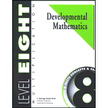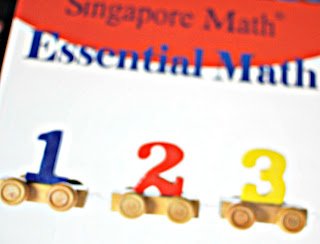My two youngest daughters aren't "math" kids. The struggles and doubts I went through with my daughter that recently graduated over her math were intense. We went through years of trying to get her to retain her multiplication tables. I bought extra programs. I felt like such a failure when we would have a school break, and she would lose months of work in weeks. We would then have to spend time brushing up and relearning what was lost.
Then, middle school, it was like a switch was flipped. She still wasn't fond of the lessons, but she seemed to grasp the concepts easier. She remembered her lessons. She made rapid progress and was totally ready for Algebra in the ninth grade. (I know many schools now teach Algebra in 8th grade, but that isn't always he best path for every child.)
I learned a lot of lessons about how children learn. Some children don't develop the ability to understand abstract concepts until they are older. In that case, math can be challenging since so much of it is abstract, especially in upper levels. Some children are naturally great at math and progress quickly. Some struggle and struggle, but with lots of practice and reinforcement, coming at concepts from multiple ways, they will learn. Eventually they might, as my daughter did, make a leap once her brain develops the maturity and ability to understand concepts that are more difficult.
Schools want everyone on the same level, or in a narrow margin. The problem with that is not all students develop at the same rate or learn in the same way. I wrote a few months ago about why levels are often a better system of development than "grades." This is because the child begins in a place where they can succeed and build skills incrementally, precept upon precept, at a pace where they can master topics.
My daughter that gave me the math woes in the early years needed a spiral program where she was repeating concepts over and over daily. She did best with that system, because the constant review let her keep the concepts fresh in her brain. She was "behind" for awhile, but once her brain was ready, she caught up quickly.
My youngest daughter needs a more mastery approach. She needs plenty of review, but she also needs more time and practice on a single concept before jumping around. She also does better with math taught through stories and plenty of fun games. And so, what I use for her is completely different than what worked for my other daughter. Using different materials doesn't work in schools, as everyone is expected to learn the same way.
When my youngest doesn't understand a concept, we can review using other materials or math games until it "clicks." That could be a couple days or a couple weeks. Sometimes, I completely back off for awhile and just review other stuff. This gives her brain a chance to rest from the stress of something it is struggling to grasp. Most of the time, when we revisit the concept, it will suddenly make sense.
For my youngest, I break her math up throughout the day. She is ADHD, and conquering thirty math problems first thing in the morning can bring her to tears and take a couple hours. Instead, I split up the assignments. She will do half in the morning, half in the afternoon. This means that her mind gets a break and goes on to other things and comes back later. She doesn't get as frustrated and overwhelmed. She doesn't procrastinate or get as distracted. What would take forever in one session actually moves much more quickly and smoothly when broken up into two sessions.
I also rotate types of math learning. For instance, this year, she will do workbook work in the morning. I will add in Khan Academy videos or math games to help explain and practice the concepts being learned, but not every day. In the afternoon, I rotate between Life of Fred, which teaches math through story, games, and an additional workbook page. The first part of this school year has my girl studying mental math videos a couple times a week, to try to build her mental math skills and build confidence in her math abilities. This may mean slower progress on her workbook work, but the skills gained in mental math lessons make it worth it. Again, it is about gaining skills and growing her brain, and sometimes that requires coming at topics from multiple ways.
I am more concerned with progress than meeting some elusive standard, which varies by school, state, and curriculum. I have seen certain concepts taught in second grade in one curriculum, but not taught until fifth grade in others. My goal is to slowly build skills, and be able to adjust when her brain matures a bit and the concepts "click."
I love materials that aren't labeled by "grade" level. When my child is growing and making progress, I don't want her to feel like she is inferior in any way because the number on the outside of the book is lower than where she feels she should be. I have already explained that the concepts inside the books vary greatly depending on the curriculum and publisher. I like "levels" better. She needs to master the concepts inside the books, not feel like dirt because she is working at a different level than what she thinks her friends are doing. With the dismal performance of the United States school systems in international testing, a large number of students aren't mastering the concepts. They move on before they have full understanding, and then feel as if they are constantly trying to catch up and understand what is just a bit beyond them. Some quit, having no confidence, feeling as if they are just "bad at math." This is why so many students graduate high school and have to take remedial courses before they are ready for college-level subjects.
I also feel we rush the process, like with every other subject in public school. It has all become a race to do more, do it faster and earlier, as if our children are machines and not humans. I don't think the science of child development supports this. In fact, I have seen that it is often detrimental to learning and to healthy mental and emotional development. The result is that children have higher rates of depression, suicidal thoughts, and even PTSD. Surely abusing our children in order for them to achieve academic achievement earlier and earlier is counterproductive.
It would seem like building strong skills, a strong foundation, more slowly would be best. Research seems to show that giving time for students to play, to be in nature, to get away from technology, all aid in tremendous mental, emotional, and physical benefits. Schools across the nation are slowly starting to add to their recess time, and are finding that attention issues are diminished in class environments. This is because children aren't meant to sit for hour upon hour at a desk doing intense book work.
Math skills have been pushed along with science in the last decade. STEM careers have led to STEM classes. Having dismal rates in international testing in math and science seems to show our students aren't measuring up internationally. Pushing concepts earlier and earlier has not improved test scores. Teaching Common Core math has not improved test scores. Instead, they slowly worsen. As a nation, we scored higher when childhood was respected. Children gain a lot of math knowledge by building forts outside and baking with grandma. At the very least, their brains develop on deeper levels than what occurs with video games and YouTube videos.
There are materials that aren't labeled with certain "grade" levels. Or, like Saxon, they cover a couple years and can be used where developmentally appropriate. Perhaps they are advanced, as many homeschooling materials are, and you can ignore the "grade" level on the front. Maybe your child is advanced and those grade levels make him or her feel superior in some way. In truth, maybe his or her brain matured more quickly in one area, but he or she may struggle elsewhere. Working from levels instead of "grades," mastering concepts and moving forward, whether fast or more slowly, keeps the child focused on learning the material, not comparing himself to others and making everything a competition.
I have become a proponent in going back to traditional pacing in math, or of letting children learn at their own pace. While some children may excel, and should be allowed to move forward at the pace that suits them, a lot of frustration for students and parents could be avoided if children are developmentally ready to learn and not forced too quickly. Other homeschool parents have discovered the same thing in educating their children, as I discovered here, here, here, and here. In fact, there are hundreds of homeschoolers that have learned the same thing. Guess what? It works! Homeschoolers test much higher on standardized tests than public schooled students on average. That doesn't mean that every homeschool student is above average. It means that most students get a strong foundation and master the concepts.
There are no C's in my homeschool. My daughter is to correct materials she gets wrong, not just get a lower grade. She doesn't turn in assignments and receive a grade. She turns in assignments, and then corrects any errors. This is about learning, not measuring her against anyone. In correcting errors, she reinforces the right way to do things. It may mean we move at a slower pace, but it is a pace where she knows what she is doing and is confident in her abilities before I move her to something more advanced. She isn't going to miss three on one assignment, miss four on the next, and not see where she is struggling. Neither of us are going to accept a bunch of errors, not because we expect perfection, but because errors tell me that she needs more practice or more explanation or more time to grasp what she is learning.
If your child is behind in math, make sure they are working at a level they can understand. Then, work steadily through concepts, ensuring mastery and a lot of review. Keep progressing. If they hit a concept they simply aren't getting, go back and review other things for awhile. Then try again. Don't let your child feel inferior if they don't understand right away. Come at concepts from different angles. Use whatever resources you can, from games to stories, to help your child advance. Split the lessons in half so they aren't overwhelmed. You are homeschooling. You can tailor the lessons to your child, if necessary. Slow down for awhile. Speed back up later when their brain matures and concepts "click." Most of all, keep positive and encourage your child every day.
Subscribe to:
Post Comments (Atom)
Depriving our Students of the Classics
In December 27, 2020, an article was published concerning a push to remove the classics from education. Entitled Even Homer Gets Mobbed ,...

-
I am attempting to read Laura's literature selections before she gets to them. I have not gotten to read everything, however. I have n...
-
I recently read North to Amaroqvik, one of Laura's required reading selections for ACE Literature and Creative Writing. I once read on ...
-
It seemed a no-brainer that Christians would flock to this movie on opening weekend. I've been looking forward to this opening for mo...




















No comments:
Post a Comment